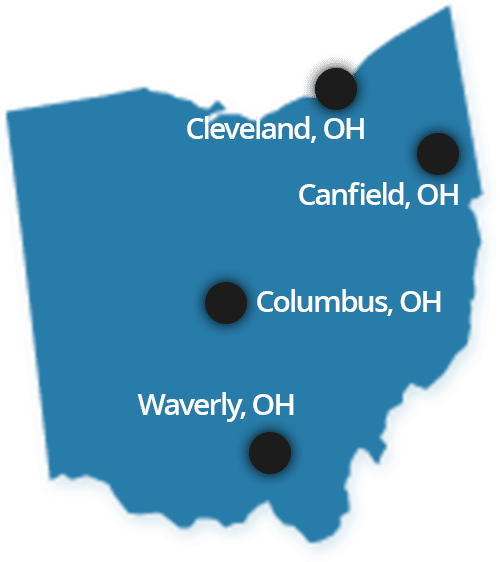According to the Economic Policy Institute, Ohio workers are illegally paid less than minimum wage about 217,000 times per year. Those violations cost each worker an average of $2,800. Few of us would take a $2,800 loss in stride, but the impact is even greater on those earning at or near minimum-wage levels. And, paying below minimum wage is just one way some employers save money by cheating employees.
Policy Matters Ohio recently analyzed information from the U.S. Department of Labor and found that between 2004 and 2018, 270 Cleveland companies had been found to have committed at least one wage theft violation. While 6,417 violations were identified in the city, the true number is probably much higher. That count includes only violations that were reported to the U.S. Department of Labor, investigated, and supported by sufficient evidence to determine a violation. Many violations are never reported.
Sometimes violations go unreported because employees don’t know they’re being paid unfairly. Sometimes workers are afraid to report violations because they can’t afford to lose their jobs. Other violations go unreported simply because employees aren’t sure how to fight back. But Ohio workers who are losing money because employers are breaking the law have options, including hiring a wage and hour attorney to help them collect what they’re owed.
At Plevin & Gallucci, we have a long, proud history of fighting for the rights of Ohio workers. Our founder, Frank L. Gallucci, Jr., started working on behalf of Cleveland-area employees in 1971, and we have carried that tradition forward for nearly 50 years, with both wage and hour and workers’ compensation representation.
What is Wage Theft?
Failure to pay at least minimum wage for every hour worked is just one type of wage theft. Others include:
- Failure to pay the premium rate required by law for overtime work;
- Misclassifying employees as independent contractors to avoid minimum wage requirements and shift tax burdens to the worker;
- Treating all salaried employees as exempt from overtime requirements;
- Requiring employees to remain onsite or perform work duties off the clock;
- Rounding down on hours worked.
Sometimes employees are unaware that their rights are being violated. So it’s important for every Ohio worker to know the basics of wage and hour law.
Ohio Wage and Hour Basics
The Ohio minimum wage for most employees is $8.55 per hour–higher than the current federal minimum wage of $7.25 per hour. Employees entitled to overtime must be paid 1.5 times their regular rate of pay for any hours they work in excess of 40 per week.
While paying a wage that is less than $8.55 per hour is the clearest way for an employer to violate minimum wage law, it’s not the only one. Anything that results in the employee actually being paid less than minimum wage for all hours worked may constitute a violation. One common example is when an employer requires employees to purchase uniforms, and the cost of uniforms drops the effective pay rate to below minimum wage.
Similarly, employers may violate overtime pay requirements by paying straight time regardless of the number of hours worked. But these violations also occur when employers don’t count certain hours, such as meetings or time spent preparing work space on the employer’s premises or job site.
Misclassification of employees as exempt is another way workers are commonly cheated of overtime pay. Contrary to popular belief, not all salaried or supervisory employees are exempt from overtime wage requirements. For example, with limited specific exceptions, an employee must earn at least $23,600 per year, or $455 per week, to be classified as exempt. But simply putting someone on salary and calling him or her a supervisor doesn’t meet the test. An exempt supervisory employee must:
- Regularly supervise at least two other employees;
- Have genuine input into management of those employees, and;
- Have management as his or her primary responsibility.
This last point is important, because many managers and assistant managers in settings such as gas stations and convenience stores spend a great deal of their time cleaning, stocking, and running the cash register. Although these employees may have managerial authority, they are typically not properly classified as exempt, since the bulk of their job duties are not managerial.
In other cases, the employer intimidates the employee into accepting less than he or she is owed, usually because the employee is afraid of getting fired. For instance, the employer might tell employees that overtime is not allowed, yet assign tasks that will keep employees late. Not wanting to rock the boat and put their jobs at risk, many employees do the work, but don’t put the extra time on their timesheets.
Wage Theft Protections for Ohio Workers
Ohio workers are protected by both the federal Fair Labor Standards Act (FLSA) and the Ohio Minimum Fair Wage Standards Act (OMFSWA). The Fair Labor Standards Act is enforced by the federal Department of Labor, Wage & Hour Division. The Ohio Act is enforced by the Bureau of Wage & Hour Administration.
But government enforcement reaches only a small percentage of the likely wage and hour violations committed in Ohio. That’s why many employees who are not receiving the wages they are owed choose to contact an experienced Ohio wage and hour attorney like the ones at Plevin & Gallucci.
To learn more about how we can help you get the money you’ve earned, just call 1-855-4PLEVIN to schedule a free consultation.

